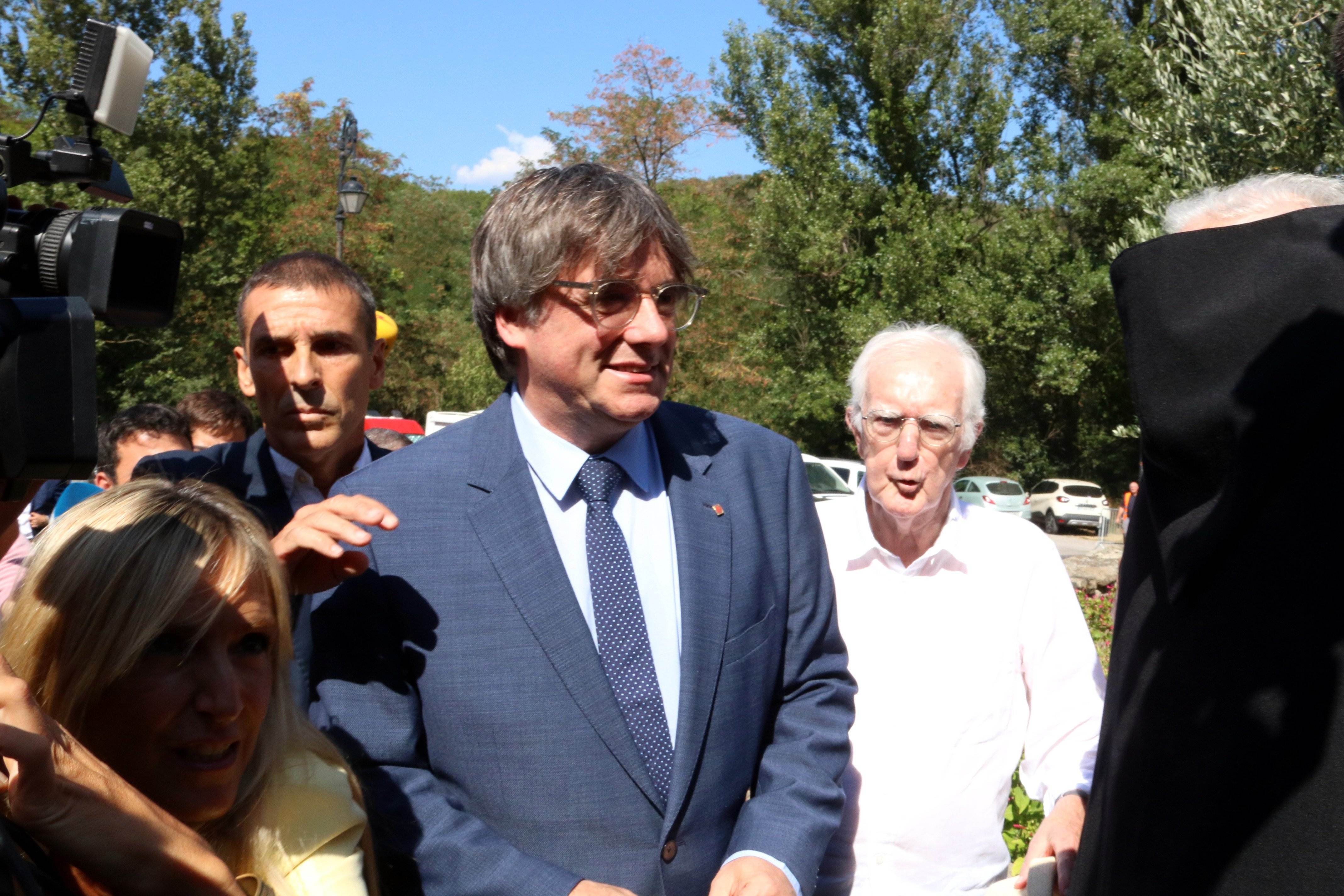Expectations at the abbey of Sant Miquel de Cuixà, a few kilometres from Prada, were high for the opportunity to once again hear a speech by Carles Puigdemont in Northern Catalonia. This Monday, the Catalan president in exile reappeared for the first time in almost two months outside of Belgium, after losing his immunity as an MEP at the beginning of July, and he did so at a kind of summit of presidents of the Generalitat of Catalonia, in which Jordi Pujol, José Montilla, Quim Torra and Pere Aragonès also took part. Puigdemont arrived at the monastery amidst chants of "President!" and "Independence!" and took part in a conference on the key figure of Pau Casals, the cellist who was the most universal of Catalan musicians, and spent part of his 35-year exile in the town of Prada, on the French side of the Pyrenean border.
If on his arrival, president Puigdemont was already received with an ovation, when he stepped up to the altar of the abbey it was repeated, and even louder, since his speech took place after that of president Montilla, who ended up being booed for his defence of a plural Spain. By contrast, Puigdemont closed his speech amid applause and, aware that his discourse on Pau Casals would be closely analyzed at a time when he is one of the key protagonists of politics in the Spanish state, giving a message of rejection of any personal solutions within the context of the overall political situation of Catalonia. Despite the great anticipation that Puigdemont's attendance at the event had caused, the president did not answer any questions from the media.
If Montilla had focused on praising the work done by Casals from exile to defend democracy and bring music to the working classes, Puigdemont, as Jordi Pujol had also done in his speech, focused on the musician's dedication to defending the Catalan language, always with great generosity. "Pau Casals made this discourse in the final stages of his life, when he no longer needed anything else and had already done everything in artistic and personal terms. The discourse was a contribution to the nation of others, to that of those who were yet to come, to save the nation", the president in exile emphasized with respect to Casals' famous "I am a Catalan" speech before the United Nations.
Pau Casals' name change
Puigdemont, who eclipsed the other four Catalan presidents appearing at this summit which is - due to the warrant for his arrest in Spain - still only possible in French-administered Northern Catalonia, also reminded those present of how the musician changed his name, having been born to a Puerto Rican mother, and thus being known as Pablo until 1932, when he changed his name to Pau, which is the equivalent name in Catalan. "People were surprised and wondered, how can it be that an artist changes his name?" recalled the president, praising his decision: "He did so to point out that ever since the Nueva Planta Decrees of the 18th century there had been a conflict open [between the Spanish state and Catalonia], and by doing so he put his international projection at risk. Because he believed that his language, Catalan, deserved to be treated the same as the rest of the world's languages."
Now, almost a hundred years later, the president in exile has established a parallel with Casals' decision in the 1930s: "When we ask for Catalan to be a living language in Europe, we do so following the same thread as the generations that have gone before us, we do it thinking of others, not ourselves." "Nothing that Pau Casals did was thinking of himself or looking for any personal way out, and we have the duty to continue doing the same," concluded Puigdemont, who closed his speech, the most anticipated of the entire conference, to a cry of Visca Catalunya lliure, "Long live free Catalonia", to which the public responded with a long ovation and further chants of "Independència!"

